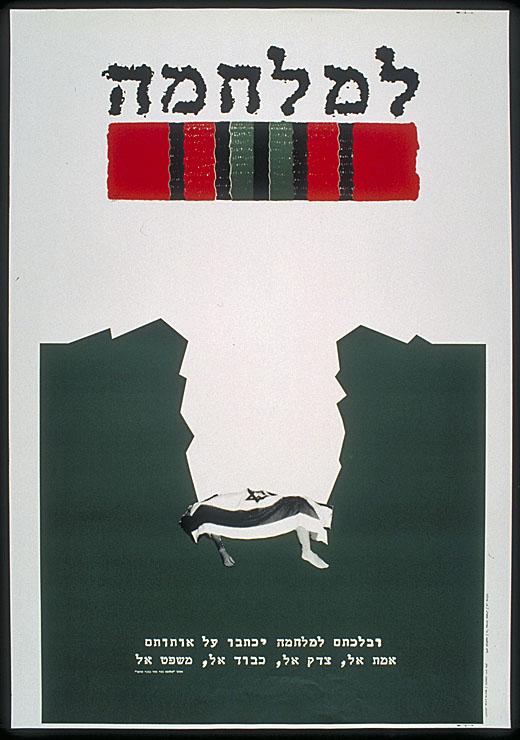Hebrew translation: To war
From: "Plakate aus Israel:
“When they go to war, they write on their flag, ‘In defense of God’s truth, God’s righteousness, God’s honor, God’s justice’” (from the song, “Song of the Sons of Light against the Sons of Darkness,” Qumran scrolls)
Ilan Molcho contrasts a quotation from a writing by the Jewish zealots who opposed the Romans with the image of a dead soldier under the Israeli flag. The selected colors—black, white, green, and red—point at the Lebanese conflict, which is tied to the Palestinian problem. The painful contrast between the words and the images are meant to illustrate that political fanatics who seek to legitimize their objectives through religious or similar arguments can only bring death, and that human and divine justice have nothing in common. To force people to reflect on these issues, Ilan Molcho put the poster up on every lamppost and posting wall, on Independence Day in 1984."
____________________________________________________
From: "Peace, Politics and PostZionism: Contemporary Left-Wing Graphic Design in Israel"
"The juxtaposition of ancient texts against contemporary imagery was and continues to be a frequently explored locally specific, left-wing design strategy. In "To War", Molcho placed a quote from the "Song of the Sons of Light Against the Sons of Darkness", one of the Dead Sea scrolls found in a cave near Qumran, below an image of a fallen soldier covered in an Israel flag. The quote reads,
When they go to war, they write on their flag, 'In defense of God‘s truth, God‘s righteousness, God‘s honor, God‘s Justice.‘
The title "To War" rests above the IDF badge used during the First Lebanon War. A popular account of the Song of the Sons of Light Against the Sons of Darkness asserts that it was written by the Essenes, a sect of Jews who flourished in isolation in Qumran from the second century BCE to the first century CE as they awaited the End of Days.
According to this account, the Essenes believed that when the battle of the End of Days occurred, they, the Sons of Light, would battle the Sons of Darkness. With the aid of God, the Sons of Light would defeat the Sons of Darkness and return to Jerusalem to worship God in the future Temple. In "To War" Molcho draws from this interpretation of Jewish history to suggest similarities between the invasion of Lebanon and the behavior the Jewish zealots at Qumran. Through the juxtaposition of this ancient text and contemporary imagery, Molcho used the tale of the Essenes as a warning of the potential dangers of legitimizing military actions using religious or Zionist doctrine. Molcho‘s visual metaphor commented on the importance of differentiating between notions of human and divine justice.
Recent scholarship on the Dead Sea Scrolls posits that Qumran was in fact a Roman plantation and that the Essenes never existed. That Molcho‘s poster was based on popular misinformation about the Essenes emphasizes that these posters are polemical. Their factual accuracy is immaterial; the emotional content is what gives them their communicative power."
"Peace, Politics and PostZionism: Contemporary Left-Wing Graphic Design in Israel" - Graduate thesis by Bareket Kezwer - 2011

